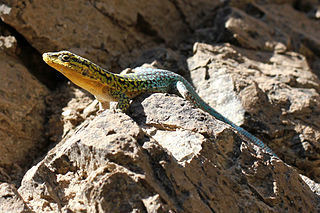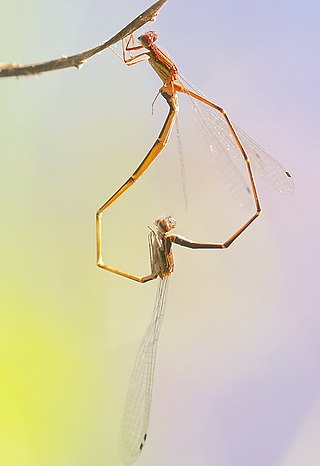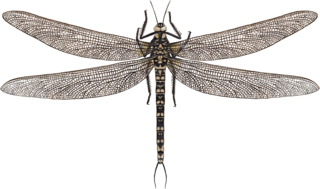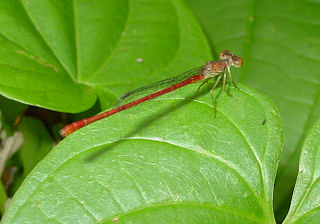
Liolaemus is a genus of iguanian lizards, containing many species, all of which are endemic to South America.

Megalagrion is a genus of damselflies in the family Coenagrionidae. It contains approximately 26 species, all of which are endemic to Hawaiʻi. Megalagrion damselflies are the only native damselflies in Hawaiʻi, and are referred to as "pinapinao" in ʻ ʻŌlelo Hawaiʻi. Other endemic Hawaiian Odonata are the dragonflies Anax strenuus and Nesogonia blackburni, which are referred to as "pinao".

Argia is a genus of damselflies of the family Coenagrionidae and of the subfamily Argiinae. It is a diverse genus which contains about 114 species and many more to be described. It is also the largest genus in Argiinae. They are found in the Western Hemisphere. They are commonly known as dancers. Although the genus name comes from Ancient Greek: ἀργία, romanized: argia, lit. 'laziness', dancers are quite active and alert damselflies. The bluer Argia species may be confused with Enallagma species.

Somatochlora, or the striped emeralds, is a genus of dragonflies in the family Corduliidae with 42 described species found across the Northern Hemisphere.

Cordulegaster is a genus of dragonfly in the family Cordulegastridae. It contains the following species:

Heteragrion is a genus of damselflies in the family Heteragrionidae.

Ophiogomphus, commonly known as snaketails, is a genus of dragonflies in the family Gomphidae. Most of the species in the genus Ophiogomphus have beautifully marked green club-shaped abdomens, which are more noticeable in the males.

Progomphus is a genus of medium-sized dragonflies in the family Gomphidae. They are found in the Americas and are largely tropical. They are one of the few Gomphids with coloured wings.

Protoneura is a genus of damselfly in the family Coenagrionidae. It contains the following species:

The Odonatoptera are a superorder of ancient winged insects, placed in the probably paraphyletic group Palaeoptera. The dragonflies and damselflies are the only living members of this group, which was far more diverse in the late Paleozoic and contained gigantic species, including the griffinflies of the order Meganisoptera. This lineage dates back at least to the Bashkirian, not quite 320 million years ago.

Telebasis is a genus of damselflies in the family Coenagrionidae. The genus occurs in the Neotropics. Most of the species are red with a few blue species in South America.

Macrothemis is a genus of dragonfly in the family Libellulidae, also known as Sylphs. It contains the following species:

Calopterygoidea is a superfamily of damselflies in the order Odonata.
Heteropodagrion croizati is a species of damselfly in the family Thaumatoneuridae.
Heteropodagrion sanguinipes is a species of damselfly in the family Thaumatoneuridae. It is found in South America.
Heteropodagrion superbum is a species of damselfly in the family Thaumatoneuridae. It is found in Central America and South America.
Pycnothele labordai is a species of South American mygalomorph spiders in the family Pycnothelidae. It is the only species in the monotypic genus Pycnothele. It was first described by F. Pérez-Miles, F. G. Costa & L. Montes de Oca in 2014 under the genus Bayana, and is found in Uruguay and Brazil. Originally placed with the funnel-web trapdoor spiders, it was transferred to the Pycnothelidae in 2020.
Heteragrionidae is a family of damselflies in the order Odonata. There are more than 50 described species in Heteragrionidae, found mainly in Central and South America.

Erythrodiplax unimaculata, also known by its common name white-tailed dragonlet is a species from the genus Erythrodiplax.













